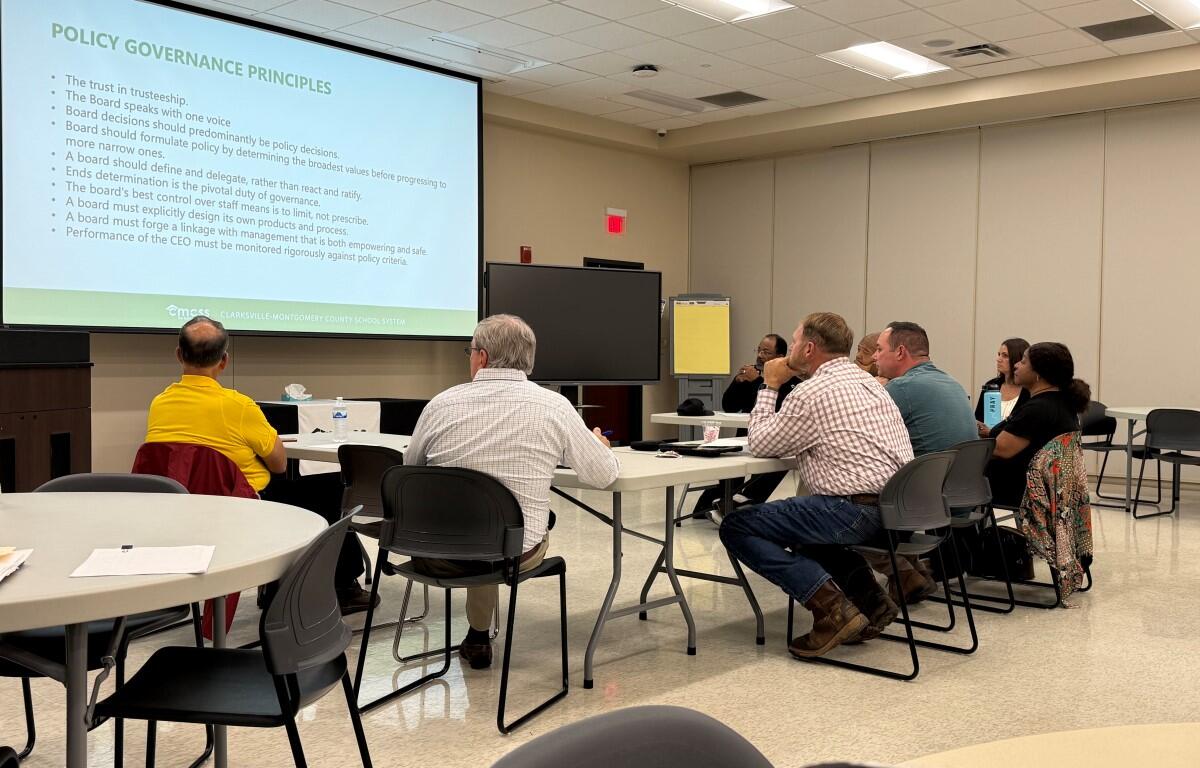CLARKSVILLE, TN (CLARKSVILLE NOW) — As talks of the current governance model for the Clarksville-Montgomery County School Board kicked off earlier this month, all seven board members convened for their annual retreat and discussed the model in depth.
There appeared to be one outstanding question following the Oct. 8 study session: Did the board give away too much of their authority when they adopted the model 20 years ago?

On Oct. 29, day two of the retreat, the board members met to discuss the model.
What does ‘loosely following’ the model mean?
After scrapping their old procedures in 2003, the CMCSS school board adopted policy governance, a model that entrusts the director of schools with the authority to execute the decisions of the board without the board members getting “bogged down” in the details.
Anthony Johnson, CMCSS Chief Communications Officer, broke down the model that was inspired by John Carver’s policy governance for the board Tuesday night. Due to various legal requirements, the school board’s model does not strictly adhere to Carver’s model, with Johnson stating, “There is absolutely flexibility with the principles of the model to shape a governance structure that works best for the organization.”
Johnson explained that most of the time, state law dictates the responsibility through verbiage like, “the LEA (Local Education Agency) shall, the board shall,” or even “the principal shall.”
“All of that to say, there’s nothing wrong with saying that we are loosely following these principles,” Johnson told the board. “Because you, at the end of the day, not following or bound to one playbook, decide, as a board, how you want to develop your policy governance manual to then implement those main principles.”
Carver’s model applies to the CMCSS model in four ways:
- Stability: sets “can” and “can’t do” expectations for the director and their staff. Additionally, prevents established policies and procedures from continuously changing based upon personal or political beliefs as the board members can change every two years.
- Efficiency: day-to-day decisions are made in real time as laws and best practices change instead of waiting weeks for the board to consider or approve new policies or other decisions.
- Innovation: The director and their staff are considered experts in the field of education or their operational areas and are “empowered” to utilize their expertise and experience to pursue innovative methods to meet expectations set by the board.
- Fiscal Responsibility: instead of the board hiring an outside firm, the director and their staff do this as part of their existing jobs.
Criticism of delegating
One main concern that emerged was the idea that the board was “abdicating” their duties because they are delegating everything to the Director of Schools, Dr. Jean Luna-Vedder.
Johnson acknowledged the criticism, explaining to the board that they could be abdicating their duties if they are not adequately supervising and carefully monitoring to ensure the director achieves the results intended through “due diligence.”
Policy governance, Johnson explained, does not give more or less authority, but is the board establishing expectations, goals and restrictions for the district through its policies and then holding the director and her staff accountable for meeting those expectations.
This allows the board to focus on the “big picture” instead of day-to-day tasks and the bureaucracy and legal compliance that can bog down the board members and “increase liability for the board.”
What CAN the board do?
The CMCSS school board is responsible for setting the policies that govern the district, developing the system budget and holding the director accountable for reaching the district’s goals.
Some of the more recent items the board has been tasked with consideration have been the approval of charter schools, rezoning districts, naming of schools and age-appropriate materials.
Board member, Aron Maberry, weighed in to share his experience trying to initiate a review of several library books when he was elected but was told he could not. School board attorney, Mark Nolan, explained that, at the time, the board didn’t have any policies on age-appropriate materials because there was no state law.
On July 1, Tennessee legislation shifted the final approving authority for age-appropriate materials challenged from a school’s library collection by a student, parent/guardian or employee to the school board.
‘School boards do not run the schools’
According to the Tennessee School Boards Association, a board exercises its power through adopting policies and the superintendent (director) determines the how, who, where and when to administer those policies.
Before turning over the meeting for board discussion, Johnson shared a quote from the TSBA website that states, “The School Board does not run the schools; it sees that they are run well.”
Carol Berry told the newly elected board members, “I was as green as an onion, even though I taught for 35 years,” she said. “People started calling as soon as I was elected, and I was trying to problem solve because I didn’t know what my role was.”
Berry explained that she was spending six hours a day talking to people and trying to problem solve, until CMCSS staff told her that the problems she was trying to solve weren’t her job. “I’m not the social worker, I’m not the psychologist…my life changed when I went to orientation with TSBA. I learned what my role is as a board member.”
“We have one employee,” said board member, Jimmy Garland, pointing to Dr. Luna-Vedder. “The other 6,000 belong to her.”


